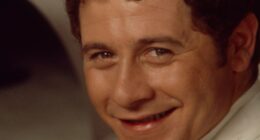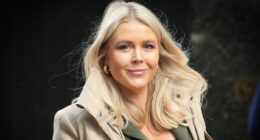The Victoria mum was suddenly faced with isolation and a newborn to look after without any support network around her.
She’s among the countless pandemic mums who raised babies under one of the toughest lockdowns in the world.

She told 9news.com.au the pandemic was tough, but it gave her moments with her daughter she may never have experienced.
“I actually think the pandemic was one of the best things that happened to me,” Burns said.
“I was forced to actually really slow down, rest, recover and just enjoy this little newborn.”
“There was no pressure to have a clean house, no pressure to leave or see anyone or do anything at all.”
While Burns didn’t have the support of her mother, who stayed in New Zealand, or any other immediate family, she was warmed by an online community of other single parents.
She doesn’t regret falling pregnant during such a turbulent time.
“I just wanted to have a baby,” she added.

For fellow Melbourne mum Emilia Rossi, though, her time in lockdown felt like a prison.
She had a toddler to wrangle, along with her newborn daughter Olympia, which she said left her feeling “despaired”.
“It was more than just loneliness – it was an overwhelming sense of desperation,” Rossi said.
“I had a strong support system in my husband, family, and a fantastic doctor, yet despite all of that, I still experienced minor postpartum depression while juggling the demands of a newborn and a toddler.”
Rossi said she is lucky her husband was a great support during her early bout of postpartum depression.

But motherhood, combined with the shock of a global crisis, made for a painful hormonal cocktail.
“It was the worst feeling I have ever experienced. I cried for no reason,” she said.
“I was physically present but mentally checked out. I felt like a zombie.”
Burns, meanwhile, did experience the pitfalls of limited access to paediatric support.
Her daughter Alexandra had a delayed diagnosis of hip dysplasia because of Melbourne’s tough restrictions.
“She was in the brace and then the cast for quite a long time,” Burns said.
“Potentially it wouldn’t have gotten to the stage of needing a cast had she been diagnosed earlier.”
Thankfully, now five years have gone by, Rossi said her kids – and herself – are doing just fine.
“They are happy, healthy, and thriving,” she said happily.

Samantha Page, chief executive of Early Childhood Australia, told 9news.com.au the initial impact on early childhood development during the pandemic can’t be ignored.
While it was certainly positive for family bonding, Page said, it deprived many kids of important social experiences.
“We know how beneficial, really good quality early years experiences can be, and particularly those opportunities to play with other children and to engage in rich learning experiences,” Page said.
“It can make it more difficult for children to feel confident and happy in environments with early childhood teachers.”
Page said children unconsciously absorb their parent’s emotions.
The trauma caused by the pandemic and lockdowns may also be felt by children, she said.
“Children sense that anxiety, but they don’t know what it’s about,” she said.
As for the parents, Page also understands how both Rossi and Burns would have such polar opposite experiences.
“The pandemic affected different people in different ways,” Page said.
“Some parents would’ve sailed through it and had a lovely bonding opportunity with, but other parents might have found it really hard to be cut off from that social support.”






